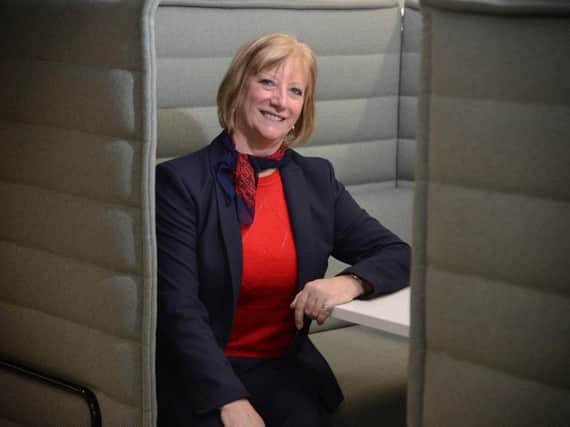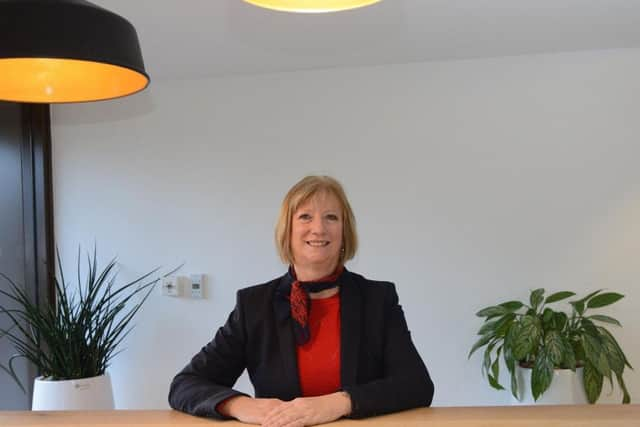The Big Interview: HRM Homecare Services MD Lynn Laughland


Lynn Laughland is managing director of Kilmarnock-based HRM Homecare Services, which is focused on older people, children and families, and those with disabilities or who require post-hospital care.
She founded the organisation in 1994, spying a gap in the market after helping a neighbour in need of personal support. But she also saw self-employment as a good fit with raising her family – and named HRM after her three children, Heather, Russell and Mhairi.
Advertisement
Hide AdAdvertisement
Hide Ad“I’ve got a combination of that caring skillset, but also business acumen – and that’s quite unique,” says Laughland, who spent a year researching the business, tapping into Business Gateway courses as it was her first foray into entrepreneurship.


HRM has been entirely self-funded to date (“according to the bank it’s rare,” she says laughing) and has taken something of a prudent approach to growth. “I attended a banking dinner very early on in my business career and listened carefully to all the stories I was being told. Sustainability’s really important… there are not a lot of margins in our sector, so you have to build your business slowly and carefully.”
The business is now a major employer with 275 staff, providing 9,000 hours a week of support, and cares for 680 customers, almost 70 per cent of whom are older people, many suffering from serious conditions such as dementia.
HRM is also the volunteer case study for Scottish Care, the industry body in Scotland representing more than 400 organisations delivering residential, nursing and day care, plus care-at-home and housing support services.
Additionally, the firm’s turnover for 2019 is set to exceed £5 million, up from £4.6m in 2018, and it has care-at-home contracts with Clackmannanshire, Glasgow, Falkirk, South Lanarkshire, North Lanarkshire and East Renfrewshire Councils, for example, although it previously lost contracts with one council.
Ambitions
Laughland is looking for the organisation to broaden its reach across Scotland – and last year she undertook Strathclyde Business School’s scale-up programme, getting the gen from success stories.
“A business like mine is quite difficult to scale in Scotland. A lot of people who have managed to get to the size I’ve reached have sold out now to plcs or European companies. I would like to be able to build a Scottish-based care business, so my plan over the next two years is hopefully to get to about an £8m turnover. That’s quite ambitious, but that’s really what I would like to do.”
The scale-up course was simply the latest in the lengthy list of qualifications Laughland has racked up in areas such as dementia, clinical hypnosis, and a masters in social work.
Advertisement
Hide AdAdvertisement
Hide AdShe had in fact wanted to be a social worker when she was mulling what to do when she left school, but her father “was having none of it” as it wasn’t a degree subject then. Instead she signed up to study applied biology and science, having shown an aptitude for the field. “He said a science degree was a good degree for a girl,” she says.
Since then Laughland’s education has never stopped. She has actively sought to become more knowledgeable about her field “because the work we do is complex and can be quite challenging”.
She adds: “I felt for years that we were being given types of work where you really needed to have an in-depth knowledge of the client group that you were supporting, so for me it’s about becoming better informed and better educated about that in order to look at the person as a holistic person requiring care… Because it’s very complicated, looking after older people. Sometimes it’s about their life journey as well, so actually you need to have a better understanding of that.”
She cites the need to look at the bigger picture for those in care. “When you’re doing their care planning with them it’s getting them to think about… who are their circles of support, what other community groups could they get involved in?”
Technology
And she sees that technology is set to play an increasingly prominent role. “I think we have to digitalise most of our administrative procedures in order to improve our communication with everybody that we deal with – families, people we look after, care workers. That’s really important, especially when you’re dealing with so many people, so many issues.”
This will help care workers, say, improve their knowledge of procedures and their access to training. It will also, she expects, improve communication with service users and their families.
Laughland also sees the potential to help target resources more effectively at people with higher levels of need on the back of relevant data. “Or it’ll tell you that someone else is actually moving about a lot and they’re quite mobile themselves, they’re very independent, and perhaps don’t need the same level of support. There’ll be more self-management, and more encouraging people to be independent.”
Scotland has a flourishing health tech sector, but like so many nations, it is set to see its aged population grow considerably – it has been forecast that north of the Border there will be 240,000 more pensioners over the next 25 years, an increase of 23.2 per cent, while the working age population will fall by 7,000.
Advertisement
Hide AdAdvertisement
Hide AdLaughland forecasts a “real shift” in society towards a population with growing support needs. “Social care is already recognised by other governments as a key economic contributor, and Scotland hasn’t quite got there yet in recognising that fact. But actually, with artificial intelligence and technology, a lot of our other industries will decline, and social care will become a very significant economic player in Scotland.”
HRM is also working in a sector where staffing remains an area of concern. The Care Inspectorate and Scottish Social Services Council (SSSC) last month revealed that 38 per cent of Scotland’s social care services in the past year reported having vacancies, unchanged from the previous 12 months.
Care-at-home services were among the many sub-sectors with vacancies significantly above the national average for all care services.
SSSC boss Lorraine Gray at the time said there were more than 200,000 people working in the social service workforce, equating to almost 8 per cent of all employment in Scotland – and its report came as the Scottish Government launched a campaign to promote careers in adult social care.
Gray said: “A vital consideration when looking at vacancies in care services is making sure that social care attracts people with the right values, skills and experience to work in the sector.”
Staffing
Laughland acknowledges the sector-wide hiring issues. As for HRM, “I think we’re doing well because we’ve spent a lot of time getting well-known in the community networks and building up community involvement. We signpost people to other services and as we’ve been doing that the brand’s been growing, people’s knowledge of us is growing, so that’s helping us to build.”
A further feather in her cap is the creation of a training centre – the HSC Futures Training Academy – to help meet HRM Homecare’s growing need for more qualified carers.
And Laughland was named business leader of the year at the Women’s Enterprise Scotland (WES) Awards 2019. “I actually was really pleased about it because it’s not often someone in my sector gets recognised externally in business, which I thought was a very positive step.”
Advertisement
Hide AdAdvertisement
Hide AdThe Institute of Directors member says she is keen to foster other entrepreneurs – and particularly female business leaders.
WES chief executive Carolyn Currie said when the awards were announced: “Women-owned businesses represent 20 per cent of Scotland’s business base and contribute a whopping £8.8 billion into the economy every year. That’s more than many of the stated growth sectors, including food and drink and sustainable tourism.”
Laughland says a key part of her role is mentoring and coaching her team – as well as a great deal of strategic work.
Also on her agenda is adjusting the mindset in terms of how we look after people in our society – in what is an a “emotive” sector.
“We’ve got quite a different cultural tone to other parts of the world. And actually, I would like to see us become more family-orientated, more supportive of our neighbours, more community focused. That’s, for me, I think the way our society should go. It’s what value we place on those people in our society. That’s the thing that’s really important.
“Just because you get old doesn’t mean that you diminish your intellect or anything else – but culturally we haven’t recognised that. That’s the direction I would like to move more strongly in because it’s difficult when families fragment and they all start to work in other places in the world. Those networks break down and I’d like to rebuild those.”
